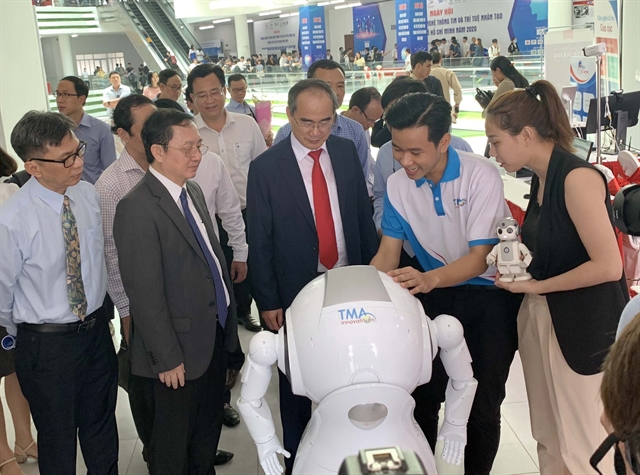HCM City to focus on AI in aim to become ‘smart city’ by 2030
2021/03/03

HCM City leaders look at AI products displayed at an exhibition held on the "Day for AI and IT Enterprises" event recently in HCM City. VNA/VNS Photo Thu Hoài
HCM CITY — HCM City authorities plan to promote Artificial Intelligence (AI) as part of its effort to become a smart city with e-government, e-enterprises and an electronic society by 2030.
Dương Anh Đức, vice chairman of the city People’s Committee, said the plan, part of the programme on “research and development of AI applications in HCM City for the 2020-2030 period”, will play an important role in smart-city development in the next five years.
Under the programme, a database of all sectors, ranging from housing, transport and environment to healthcare, will share data among all the city’s administrative departments.
This will help social organisations, businesses and residents have better access to public information and services online provided through mobile devices and other means, according to Đức.
The programme also focuses on researching and developing technologies using AI, developing human resources for AI through education and training, and enhancing academic communications with foreign AI professionals.
The city will focus on developing start-ups and small- and medium-sized enterprises (SMEs) in the field of AI.
The city is encouraging businesses to apply AI to enhance competitiveness and is also calling for investment in the field and promotion of AI products made by Vietnamese.
The city aims to increase by 20 per cent per year the number of scientific works, AI patents and AI applications, and invite leading AI experts to work short or long term in the city.
It has also called for investment in telecommunications and IoT (Internet of Things) infrastructure, and e-identification platforms in order to develop a digital government and economy.
The city will set up AI hubs that will include AI training centres, AI research clutters and a centre for AI start-ups, which will be connected with one another through the city’s data centre and infrastructure.
Digital government
The city aims to complete its shared database and open data ecosystem by 2025. When the shared database and open data ecosystem are completed, they will be connected to national databases to serve the city’s e-government.
The city also aims to offer all public services online by 2030.
“Data is currently shared and used mostly by the city’s district authorities, administrative departments, people and businesses. So, utility apps will become a necessary tool to serve people better,” Võ Thị Trung Trinh, deputy director of the city Department of Information and Communications, said.
Dozens of apps in the transport, housing, and health sectors have appeared in recent years. They are easy to use and available on both Android OS and iOS operating systems, she said.
The city has introduced apps that help people notify authorities about incidents like broken water pipes, downed power lines and fallen trees.
The city has also digitised about 60 per cent of civil status books, and the work is expected to be available in June. Based on this database, other departments like education and health will upgrade their databases.
Such databases will allow the Department of Education and Training to forecast the school-age population to meet the needs of new students, while the Department of Health will set up a shared medical record system among hospitals in the city and the country.
In addition, the rate of residents and enterprises having electronic accounts for payments is expected to be more than 85 per cent by 2030.
Regarding the digital economy, the city has focused on 10 key sectors, including healthcare, education, transportation, finance-banking, tourism, agriculture, logistics, environment, energy, and human resources.
By 2030, the digital economy is expected to account for 40 per cent of HCM City’s gross regional domestic product and annual labour productivity will increase at least 9 per cent. — VNS
Reference: https://vietnamnews.vn/society/891017/hcm-city-to-focus-on-ai-in-aim-to-become-smart-city-by-2030.html
